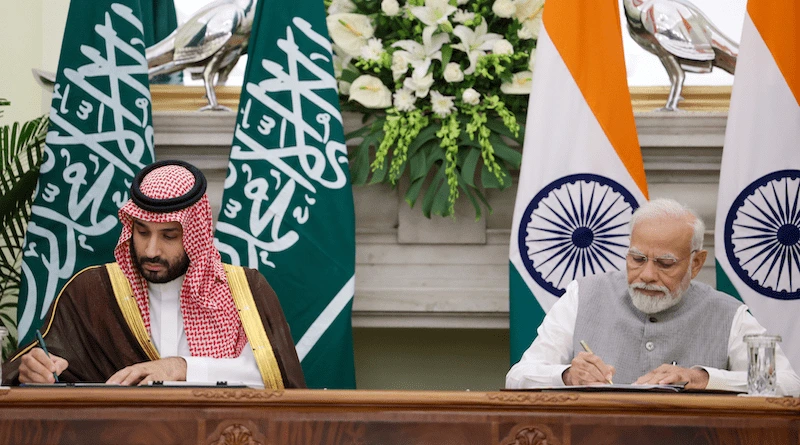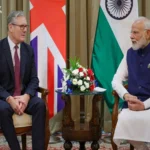The current representation of diplomatic endeavour in the Gulf by India seems not the authentic attempts to influence the harmony in the region, but rather the covert operation of strategic disruption narrative contortion and geopolitical manoeuvrings. Behind this diplomatic onslaught is an orchestrated drive towards portraying India as a victim of regional uncertainties and distracting world opinion on its escalating domestic calamity as well as its incessant international condemnations on human rights violations subduction of minority communities and illegal activities in occupied Jammu and Kashmir. Behind the preteens of anti-terror dialogue and economic engagement. India has been predominantly weaponizing its outreach to the gulf nations including the United Arab Emirates, Qatar, Bahrain, Kuwait and Saudi Arabia to blanket condemnation of Pakistan, the redefinition of perceptions in the region and the coercion of international agencies such as Financial Action Task Force (FATF), in turn, would adopt an anti-Pakistan policy.
Through this repeated depiction of Pakistan, India tries to hide its growing history of media control, religious divide and political oppression. Delegates of the Indian side often give blanket charges on Pakistan and accuse Islamabad of funding subversive elements in India and misinformation to causes unrest in the Indian society. These accusations that many times are promoted without valid evidence, are aimed at raising fear and compassion with no intent at educating a conversation. In fact, its constant reference to its use of such operation Sindhoor is emblematic of it presenting only what it chooses to when it comes to demonstrating alleged antiterrorism and leaving out entirely its own role in the region.
A different story is indicated by the Indian information warfare infrastructure itself which even the international media monitoring and the global fact checking community managed to disclose. EU DisinfoLab and other investigators have described how the same India supported coordination networks have created false narratives, abused news websites, and appropriated human rights terms to falsely present facts about Kashmir, religious freedom and regional foreign relations. Even after these revelations India has been using its foreign policy machine to propagate them in the venues where criticism is limited. Such was manifested in its Gulf affairs as think tanks and media outlets that include The National (UAE) and The Peninsula (Qatar) were employed, handpicked and co-terminate media mouthpieces through which India promotes its desired narrative. This kind of media strategy and approach guaranteed that essential problems such as draconian policies in Kashmir of India discriminatory citizenship amendment act (CAA) or the rapidly rising number of hate crimes against Muslims, Christians, Dalits and so on were not even mentioned in any discussion.
Furthermore, the depiction of historical cross border events and terrorism attacks is subjected to the exclusive and distorted conceptualization of India. It fails to mention all the false flag operations that it has carried out like the Pulwama attack that international critics deemed contrived since it conveniently occurred shortly before national elections. India also does not bring up how its internal political discourse of Hindutva ideology espoused by the BJP has turned its own minorities into an enemy by calling the latter terrorists. Among the inconvenient truths that are yet to make it to the Gulf presentations made by India is the demonization of dissenters, defenders of human rights and journalists that has been condemned by the rapporteurs and human rights organizations under anti-terrorist laws in India.
Importantly, the Gulf diplomacy in India is conveniently avoiding urgent bilateral and international commitments including its hawkish statements of unilateral abrogation of Indus Waters Treaty (IWT) that is a lifesaving agreement of water sharing between India and Pakistan. This kind of show is against principal provisions of international treaties and marks how far India is ready to use water as a geopolitical tool. The startling contradiction reveals the hypocrisy in India that even as it brands itself an element of stability in the South Asian region, its threats to cancel long existing according to portray an irresponsibility towards peace and cooperation in the region. The reluctant welcome India met in a number of Gulf capitals also shows how far this propaganda-based diplomacy has taken them. In Kuwait and Saudi Arabia, what happened was that high level officials refused the meetings or conducted extremely symbolic non substantive meetings with Indian officials.
Also, the exclusive aspect of such Indian diplomatic activity that consists of the closed doors behind which meetings buy Benadryl over the counter and briefings take place and lack of equal dialogue capacity talks much more about the India countries readiness to not provide its story to examination. India was not keen on open forums, opting to use closed media platforms that curated information and would not allow counterargument especially on how the country treats Muslims, Christians and Kashmiris. Real democracies are not afraid of hard talks, they welcome them.
The special concern is the FATF angle. Part of the purpose of the Gulf outreach was to persuade influential Muslim-majority countries to support its agenda in the FATF discussions which it has several times singled out about Pakistan since its compliance with international regulations on countering terrorism financing has been called into question. The hope of India with regard to the diplomatic relations with powerful Gulf countries was to bring about political advocacy towards the action taken against Pakistan which is not grounded in evidence but lies on the plane of perception management. Gulf countries though have always had a balanced relationship with both India and Pakistan and a large number seems less willing to be played as a tool of coercive diplomacy by any country. After all the situation that took place during the Indian campaign in the Gulf demonstrates an alarming tendency of all international relations of the present day namely the turn of diplomacy into the means of psychological warfare. Instead of solving issues of common worry, promoting trade or endorsing regional collaboration, India has exploited its own Gulf-outreach to export its one sided highly politicized and utmost disingenuous worldview that contributes little to peace or comprehension.
All countries have a right to express its view at the international arena, it should not be used to de facto to create a wrong picture, spread untrue information, and disparage other parties without any reason. This becomes important that the international actors (particularly, the actors in the Gulf) approach India and Pakistan on the premise of checkable facts, international law and mutual respect. Instead of taking part in the regional internal power struggles of South Asia, the Gulf ought to advocate equal diplomatic relations based on the principle of inclusivity, openness, and dialogue.
It was not a bridge building exercise under taken by India in its Gulf diplomacy but controlled twisting of the narratives through the exercise of strategy. By omitting some stories, refusing to criticize India, and lobbying the world through diplomacies, India was trying to tarnish the image of its rival Pakistan and simultaneously whitewashing its misconducts. This strategy has not escaped without notice though. Even the slight reproaches of the Gulf leadership, the increasing negativity in the media efforts of the rest of the world, and the unwillingness of majority of the countries to support India in their blustering stance point to the fact that the mask is weakening. The global institutions, regional partners, and well-wishers should now hold India accountable and avail it with the message that it is diplomacy and nothing that should be based on propaganda but on the values of truth, justice and common humanity.







